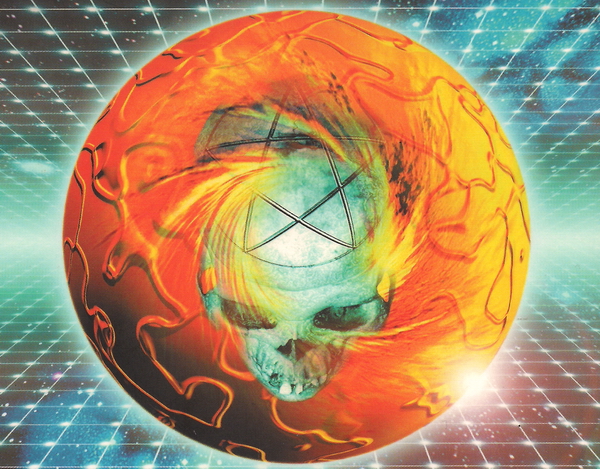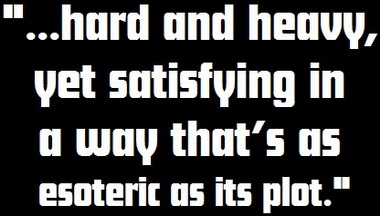|
| |
|
STORY PLACEMENT THIS STORY TAKES PLACE BETWEEN "THE BLUE ANGEL" AND "FRONTIER WORLDS."
WRITTEN BY SIMON BUCHER-JONES & MARK CLAPHAM
RECOMMENDED PURCHASE OFFICIAL BBC 'EIGHTH DOCTOR' PAPERBACK (ISBN 0-563-55585-8) RELEASED IN OCTOBER 1999.
BLURB Twelve million years ago, a war touched the Earth briefly. Now, in Antarctica, an archaeological team has discovered the detritus of the conflict. And it's
alive. ago, a creature evol- ved that was capable of consuming all life in the universe. Now someone is desperate enough to want to
revive it. universe, things move. They're hungry. And something has given them the scent of our
space / time. Doctor has learnt of the war and feels he must intervene - but it's more than just a local conflict of interest. One group of combatants is from his PERSONAL future... the other has never existed. |
|
|
The Taking of Planet 5 OCTOBER 1999
When I first read Simon Boucher-Jones’ novel for Virgin publishing, The Death of Art, I didn’t expect that one day I’d be trawling though a tome brimful with prose even more dense and impenetrable than that it housed. At the time, I put my alienation down to the abstruse complexity of the New Adventures’ ‘psi-powers’ arc, of which The Death of Art formed a part. However, when compared with Boucher-Jones’ next offering, and indeed the intricacies of BBC Books’ post-Interference arc, The Death of Art suddenly doesn’t seem quite as exigent as text.
Being paired with co-author Mark Clapham didn’t do anything to curb Boucher-Jones’ inimitably garrulous approach. The Taking of Planet 5 manages to be even more difficult to read than its predecessor, the co-authors fusing protracted sentences with specious technobabble. In isolation, this might have been pardonable, but when coupled with a veritable flood of faceless supporting characters, the result is almost fatal.
Yet, for all its fundamental flaws, The Taking of Planet 5 has one redeeming virtue that not only makes it palatable, but something of an unlikely triumph: its sheer ambition. This novel is bristling with a number of staggeringly bold and incredible images and ideas, each of which is painted in intimate detail. Most of them are borne of other writers’ work – almost every concept in the book is derived from Lawrence Miles’ musings, 1970s Who serials or Lovecraftian mythology – but this doesn’t negate the fact that Boucher-Jones and Clapham have taken some inspirational material and expounded upon it in a pleasingly overt way.
The Celestis, for instance, were an inspiring idea that their creator had only ever lightly toyed with. Here though, Boucher-Jones and Clapham take them and their pocket-universe home of Mictlan and flesh them out in all their hellish glory. Gallifrey’s future Celestial Interventional Agency aren’t just the depraved but the damned – they’ve created their own bloody version of hell and now they’re trapped in it. Their fate at the end of this novel is almost a mercy.
supporting characters notwithstand- ing, the authors handle the regulars well. Their portrayal of the Doctor is as nebulous as their narrative, the Time Lord still palpably struggling to work out what has been happening to him since his past was changed in Interference. Amidst the haze though are moments of burning clarity in which the Doctor of old shines through: the scene where he tries to impart the “secret of the universe” to Fitz stands out in particular, as does the chilling sequence that sees him floating in the vacuum of space, only the power of his will holding back what would inevitably be a catastrophic regeneration. If he’s going to have to die, he at least wants his friends to be able to recognise the corpse. Fitz is more solidly portrayed – ever the comic hero, in one moment contemplating giving Compassion one, and then in the next saving the Doctor’s life.
Ultimately though, The Taking of Planet 5 belongs to Compassion. After a stunning debut in Interference, Paul Magrs and Jeremy Hoad did little with her in The Blue Angel, but here Boucher-Jones and Clapham really milk her for all she’s worth. Her cold, caustic exterior is present and correct, but for the first time she starts to come across as more than just an odious template. This novel does a splendid job of conveying the idea that Compassion is a sponge, susceptible to the influence of the signals that she picks up, but intelligent and independent with it; nobody’s fool. Her involvement with the future Time Lords’ TARDIS rebellion is without a doubt the highlight of the novel – not only is it scrumptiously prophetic, but it’s abounding with audacious and enduring imagery. I can’t decide which leaves more of an impression – a TARDIS rupturing and being stretched out over twelve million years, jettisoning Compassion along the way; or battle TARDISes rising up against their pitiless Time Lords masters, Compassion effectively leading the charge.
On balance, I think that if The Taking of Planet 5 had followed a
couple of comparatively undemanding novels, then I’d have probably
received it a lot better. The trouble is, it’s not a book that can really
be enjoyed in isolation, and so inevitably anyone who reads it is coming
off the back of Interference and The Blue Angel, desperate
for a read that won’t make their brain bleed. This one is hard and it’s
heavy, yet it’s satisfying in a way that’s as esoteric as its plot.
|
|
|
Copyright © E.G. Wolverson 2010
E.G. Wolverson has asserted his right under the Copyright, Designs and Patents Act, 1988 to be identified as the author of this work. |
|
|
Unless otherwise stated, all images on this site are copyrighted to the BBC and are used solely for promotional purposes. ‘Doctor Who’ is copyright © by the BBC. No copyright infringement is intended. |
|

.jpg)
.jpg)

 Moreover
Moreover